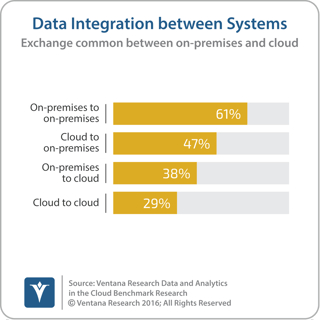Ventana Research analysts recently published our research agendas for 2017. As we put together these plans we think about the forces that are shaping the markets that we cover and then craft agendas that study these issues to provide insights for our community. I’ve been working in the business intelligence (BI) and analytics market for nearly 25 years, and throughout that time the industry has been trying to make analytics useful to increasingly wider audiences. That focus continues to today. Better search and presentation methods, including visual discovery and natural-language processing, are promising ways to engage more users. We also see organizations supporting their users in specific functional roles with relevant and accessible analytics. My colleagues examine these issues as part of their agendas in the Office of Finance, Sales, Marketing, Customer Experience, Operations and Supply Chain, and Human Capital Management. While their agendas include analytics within specific domains, my own research focuses on a range of analytics issues across domains including cloud computing, mobility, collaboration, data science and the Internet of Things.
Adoption of analytics in the cloud, as evidenced in our Data and Analytics in the Cloud research continues, promising both to shorten the analytic time to value and to provide universal accessibility in a variety of devices and locations. Organizations also continue to expand cloud usage and acceptance for a wider variety of workloads. With the existence of more data sources in the cloud, we see a new information highway emerging based on cloud-enabled analytics and integration capabilities. The research finds nearly half (47%) of organizations moving data from cloud systems to on-premises and more than one-quarter (29%) moving data between cloud-based systems. Another recent example, from our Internet of Things Benchmark Research, shows nearly two in five (39%) organizations [IoT Q39] processing messages or events in the cloud as part of their IoT and operational intelligence implementations.
the analytic time to value and to provide universal accessibility in a variety of devices and locations. Organizations also continue to expand cloud usage and acceptance for a wider variety of workloads. With the existence of more data sources in the cloud, we see a new information highway emerging based on cloud-enabled analytics and integration capabilities. The research finds nearly half (47%) of organizations moving data from cloud systems to on-premises and more than one-quarter (29%) moving data between cloud-based systems. Another recent example, from our Internet of Things Benchmark Research, shows nearly two in five (39%) organizations [IoT Q39] processing messages or events in the cloud as part of their IoT and operational intelligence implementations.
Users have come to expect and organizations are providing expanded access to analytics and BI via mobile devices. We recently examined vendor offerings in the Mobile Analytics and Business Intelligence Value Index for 2016. Simplification of the design of user interfaces that work on mobile devices in a variety of formats will continue to improve access to analytics. Cloud deployments coupled with HTML5 are key elements of a mobile strategy. We’ll monitor the use mobile technology for easy and continuous access to and distribution of analytics.
Mobile technology also enables constant communication and collaboration. Social media has conditioned the market to expect and embrace collaboration. Forward-looking organizations are deploying collaboration technologies to put analytics into action, supporting both dialogues and workflow around decision-making. We’ll be checking market trends to monitor the state of collaboration for analytics across business and IT.
Making analytics more accessible is particularly challenging when it comes to data science. Data science includes a variety of advanced analytic techniques including predictive, descriptive and prescriptive analytics as well machine learning. These techniques are critical to understanding the potential of big data, and as big data continues to rise, the importance of data science rises as well. However, most organizations are constrained by limited people resources who have the skills necessary to create these analyses. One trend we are watching is the emergence of machine learning to optimize actions, decisions and processes and require fewer highly skilled resources. Machine learning can also be a way to exploit big data for business optimization; we’ll be conducting benchmark research on how organizations are using big data in their business processes.
The Internet of Things is another key area of big data analytics, and as noted above, we recently published benchmark research on it. An increasing number of devices are instrumented and connected to generate massive amounts of data on an ongoing basis. We’ll continue to share insights from this groundbreaking research in the coming months. We’ll also explore how big data and streaming technologies intersect with data science to enable continuous analytics on the IoT stream of information.
We’ll be studying these issues and more throughout the year. Please download and review our full Analytics research agenda. I invite you to participate in this research as we conduct it during the year. I look forward to sharing the insights we discover and to helping your organization apply those insights to its business needs.
Regards,
David












